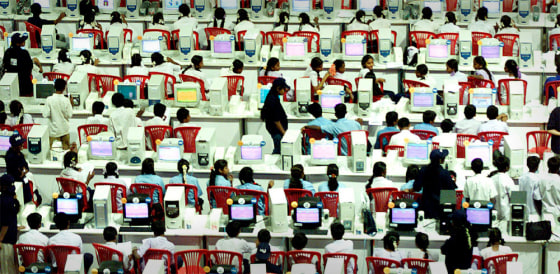I’m not sure whose keynote speech it was (Steve Jobs? Bill Gates?) or even where it was given (Comdex? CES? MacWorld?). I know that it didn’t really make a big impression on me at the time: The announcement that "computers will soon be a part of every aspect of our lives" sounded more like sales hype than prognostication.
There was talk of personal computers being the “hub” of life at home — controlling nearly every part of our leisure time. Everything from watching TV and movies, listening to music, reading books, looking at photographs were all discussed as part of the visionary plan.
Does any of this sound familiar? It should. With a world full of TiVos and Replays and Media Center computers, Macs, iPods and other MP3 players and digital cameras everywhere (up to and including inside cellular phones), what was just a calculated wish a few years ago is now just plain reality.

Let’s take music. Twenty years ago the way we handled music was mechanical. Turntables, LP’s, tape (8-tracks and cassettes) were all analog mediums. Then came the introduction of the CD. I remember what a big deal it was that for the first time lasers were being tamed to reproduce music. In the beginning, we saw pictures taken inside the two or three factories where CDs were being manufactured. People wearing masks in dust-free rooms were working the giant machines. Fast-forward to today. Do you ever think twice about dust-free environments when you burn a CD in your computer?
How about DVDs? With the technology only a few years old now we’re able to make our own DVDs in our PCs — and in stand-alone recorders that hook-up to our home-theater systems. How long before VHS technology will be gathering dust on the shelves of millions of homes?
Don’t forget telephones. For more than one hundred years, two skinny copper wires have brought voice and data into our homes. Whether it was (or is) analog POTS (analog Plain Old Telephone Service), or ISDN (slow digital) or DSL (fast digital) think about what’s happening now — the next step. Digital telephone service is now available on the same coaxial cable that brings you hundreds of channels of digital television signals, plus very high-speed Internet access. And, in many cases, the new service is being offered at very, very competitive prices. The competition should be a good thing for consumers.
Cellular phones are a perfect example. Big and analog at the beginning — now they’re small, digital, and about 1,000 percent better than anything so complex has a right to be. Like these other technologies it’s something we now take for granted.

It amazes me that all of the speeches and talks I’ve heard over the last few years are “right on” - nearly every part of our lives is now touched by computers and computer technology. More so than ever before.
Even people I know who don’t own a personal computer of any kind are affected by the technology in some way, shape or form. Check out their phone answering machine, CD and DVD players. And I’m pretty sure they’ve accessed computers from their local public libraries when they need to research a topic. They may not “own” a computer but even personal computers are still a big part of their lives.

And I’m happy to report that this new technology is going to continue to touch our lives – in ways we never thought possible. Last night I watched a story on TV about a doctor who is having some success in restoring vision by implanting wafer-thin computer chips into the eyes of people who’ve lost their eyesight due to Retinitis Pigmentosa. This is just one of thousands of ways computer technology is affecting our lives. It’s pretty amazing if you think about it – and it’s only the beginning.
Within the next few years, television will catch up to music and other mediums and finally make the leap from analog to digital. At the point when the federal government takes the old analog frequencies away and makes everyone watch digital and improved-definition signals one of the last bastions of the past will quickly fade away. I wonder what’s going to happen to the gazillions of soon-to-be useless TVs out there. I hope someone else is thinking about that too.
Decades ago, children of all ages loved the comic strip character Dick Tracy. Everyone loved the futuristic gadget that the famed law officer used when he talked on his “2-way wrist radio.” Years later, when television was the big thing, Tracy’s wrist sported a “2-way wrist TV.” What do you think he’d be using these days?
It’s only a few days until the next MacWorld and the Consumer Electronics shows. That means it’s a short time until we hear the next visions for our technological future. I can’t wait.
